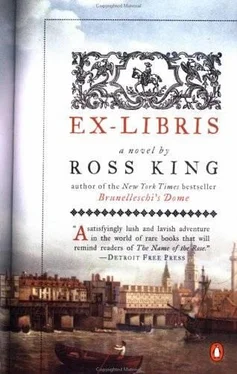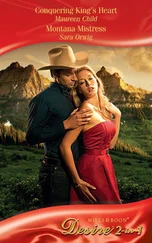And so I had returned to Nonsuch House that evening with only a vague clue as to when Sir Ambrose might have encrypted the verse. Still, Thimbleby's account was encouraging. If the verse had been encrypted in the 1640s, at the outbreak, or even during, the Civil War, my theory made sense. The cipher must make reference to a treasure, including perhaps the parchment, which had been hidden-at Pontifex Hall or elsewhere-and was meant to be recovered once the Parliamentarians were defeated and it was safe to return to Pontifex Hall. But the treasure had not been recovered. Why not? Because Sir Ambrose had been murdered, as Alethea claimed? But murdered when? I realised I didn't know when Sir Ambrose died. It must have been before the end of the Civil War in 1651, when Pontifex Hall had been expropriated, but I couldn't remember Alethea's having said.
Before slipping the page back beneath the floorboards I had studied it for a moment, holding it to the light of the candle, looking first at the watermark, then at the close-set lines, the slight impression of the mould-mesh criss-crossing the surface. I thought of Thimbleby's disquisition and wondered what exactly this particular page had been made from. Fishnet? The pages of a book or pamphlet whose ink had been effaced? The winding-sheet from some ancient skeleton? I thought how odd it was that each page, no matter how flawlessly white, no matter what its inscription or watermark, always harboured another text, another identity, beneath its surface, palimpsested and invisible, like a secret ink that can be seen only when rubbed with magic dust or exposed to flame. But what dust or flame, I wondered, might bring Sir Ambrose's message back to the surface, back to life?
I had tucked the cipher between the scantlings, beside another piece of paper, one also, it seemed, of inferior quality and inscribed with a worn goose quill. This was the letter from Alethea, dated five days ago, which Monk had retrieved from the General Letter Office. What secret message, I wondered, was occulted beneath its blotchy ink, behind the politely cryptic words that rose from the page in Lady Marchamont's old-fashioned scrawl?
I had read it through once again, feeling a turmoil in my belly and something insistent and unfamiliar nudging and squirming behind my breastbone.
My good Sir:
Please forgive the intrusion of another letter. I wonder if you might meet me in a week's time, on the 21 stof July, at six o'clock in the evening? You may call for me in London, at Pulteney House, on the north side of Lincoln's Inn Fields. Suffice it to say, for the moment, that matters of some importance have arisen.
I shall look forward to your company. I fear the usual discretion must still apply.
Your most obliging servant,
Alethea
The usual discretions , I thought mirthlessly as, lying in bed an hour later, I remembered the shellac in which her seal-or a counterfeit of it-had been impressed. Alethea was, it seemed, still no more discreet as far as the Post Office was concerned: a puzzling bout of laxity, I thought, in someone otherwise obsessed with secrecy. At first I didn't take her warning too seriously. I even convinced myself, after the first couple of readings, that perhaps I was wrong and the letter had not been opened after all. But as I travelled back and forth from Shadwell the next day I had the impression-the vaguest impression-that I was being followed. Or perhaps only watched. There was nothing specific, only a series of peculiar incidents that I might not have noticed were it not for the letter, which, like so many things these days, had set my nerves on edge. The sculler that pushed off from the quay a bare moment after mine. The image of the figure behind me reflected in the door-window as Thimbleby and I pushed into the Old Ship to eat our dinner. The narrowed pair of eyes watching me through the slim gap in a shelf as I browsed the aisles of a bookshop later that afternoon on the Southwark end of London Bridge. Even Nonsuch House seemed somehow altered. People I failed to recognise entered and, after a few cursory glances along the shelves, departed without a purchase; others simply peered through the window before slipping back into the crowds. And as I stepped outside to raise my awning a man across the carriageway started almost guiltily to life, then sauntered away.
No, no, it was nothing. Nothing at all. Or so I had told myself, sternly, as I set out the next morning for Alsatia. But why, then, was I craning my neck every minute to peer behind us, fearing what I might see framed for a second in the tiny oval of the hack's quarter-light?
But nothing appeared in the window, and I had forgotten my mysterious pursuers-indeed, I had forgotten almost everything else, including Alethea and her 'matters of some importance'-as I pushed past the waiter and stepped through the door of the Golden Horn.
***
At nine o'clock precisely Dr. Samuel Pickvance stepped forward to a table, rapped its surface sharply with a mallet and cleared his throat for silence. He was in perhaps the fortieth year of his age, a tall, emaciated man with a widow's peak, a conspicuous nose and thin, ascetic lips that seemed to be curled in a moue of contempt. He loomed before us on a raised platform, which he occupied like a magistrate on his bench, or perhaps more like a priest at the altar, wielding his mallet like a sanctus bell or aspergillum. He rapped it a second time, even more sharply, and the room at last fell silent. The ritual was about to begin.
I had slipped into one of the last available seats, in the back row, nearest the door. The Golden Horn was still dark except for its single rush-candle and a smoke-roiling beam of sunlight that fell obliquely across the room like a toppled girder. But Pickvance now produced a lantern, which he lit ceremoniously with a taper produced by his assistant, a young man with reddish hair. Now the row of heads in front of me sharpened into detail, including that of the automaton in the corner. It grinned back at me, smug and clever.
Entering the room a few minutes earlier I had discovered myself in the midst of one of those milling crowds so loved by pickpockets. Most of the assembly had been claiming the forty-odd chairs that were arranged in rows before the platform, on which stood the table and, a minute later, Pickvance and his altar-boy. I had been expecting to recognise someone-one of my clients, perhaps, or another bookseller or two. But I didn't recognise a soul, not even when the lantern was lit. And I was taken aback by what I saw. Pickvance's audience-for so we seemed-did not look especially different from the patrons I had seen here two nights before; indeed, it could have been the same group, for all I could tell. Most were dressed in leather breeches and rucked linen, with broken felt hats jammed low on their brows; a few others wore the black homespun and grim expressions of Quakers or Anabaptists. Curiously enough, a few Cavaliers were also present among them, looking prosperous and wicked, smirking to themselves or winking lewdly at one another, legs crossed, V-shaped beards neatly cultivated. What mysterious enterprise could possibly have banded together such an ill-assorted company?
But when the auction commenced and the first of the lots were cried, I realised why I failed to recognise anyone-why I hadn't seen any of them in my shop and why there were no booksellers among them, or at least none of the reputable booksellers I knew. Dr. Pickvance wasn't so much a priest or a magistrate, I decided, as a mountebank perched at his stall in Bartholomew Fair, hoodwinking a gullible audience. He was either an ignoramus or a cheat, because even from the back of the room I could see that he was embellishing and inflating each of the volumes which his assistant, introduced as Mr. Skipper, held up for viewing. It was an outrage. Books bound in ordinary buckram or even plain canvas were called 'the finest doublure ' or 'most excellent crushed levant', while everything else on show was 'hand-tooled', 'repoussé', 'opulent' and 'exquisite', with 'Aldine' this and 'Plantinus' that, bound specially by 'the late King Charles's binder' or even 'the incomparable Nicholas Ferrar of Little Gidding'.
Читать дальше












